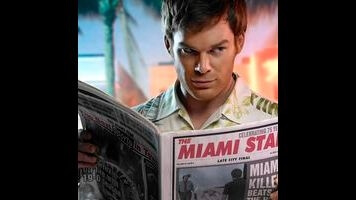Dexter: "Do You Take Dexter Morgan?"

“I promise to be the very best husband and father I can be.” —Dexter to Maria, at the wedding
“A completely, utterly honest vow.” —Dexter, via voiceover
This is going to sound like an insult, but I mean it as a compliment: The trick to Dexter is making the viewer believe their favorite serial killer is evolving and becoming more human, all while each season essentially hits the reset button. In order for the show to work, Dexter still has to feed his inner beast and kill evil-doers in his spare time, but we have to believe that he’s slowly finding his way out of the forest and that one day he can, Pinocchio-like, become a real boy. When it was first announced that Showtime was re-upping the show for at least two more seasons, it seemed like a creatively dubious, if not impossible, proposition. Because really, where else can the writers take this character (to say nothing of the stock supporting players)? And now, after an entertaining close to Season Three—which came together quite smoothly after a so-so start—I’m convinced that maybe the show has legs, after all. When the changes to Dexter are this incremental—while giving the appearance of being monumental—they can baby-step as long as they’d like.
One of the fun things about Dexter is that when he lies, they’re frequently lies of omission: He’ll say one half-truth to a person, then confess the whole truth to us via voiceover. But what makes the lines quoted above so interesting is that he’s telling the truth and that we’re convinced of it. Being “the very best husband and father I can be” is far from being the best husband and father; when you’re married to a serial killer without knowing it, obviously there are cracks in the foundation. But I think we can discern that the cold and calculating Dexter really does have feelings about the people in his life, even if he denies them or compartmentalizes them. When he sees Rita in her wedding dress, one could easily mistake him for just an ordinary groom thunderstruck at his wife-to-be at her most radiant. Though I think the Dexter character evolves at a slower pace than it might seem, you can see a clear difference between the Dexter of Season One and the Dexter of Season Three with regard to Rita: She’s no longer just a damaged, gullible single mother who can offer him the cover of a normal life, but someone who lead him along that long and winding path to an actual normal life. He cares about her, and might even love her.
Then again, Rita hasn’t been entirely honest with him. “Do You Take Dexter Morgan?” was explicitly about the secrets that we all keep, large and small: LaGuerta has to close the file on Ellen Wolf, knowing that Miguel murdered her yet still wields enough power in death to make any unveiling of that truth untenable; Angel spills his guts to LaGuerta about how he met his new girlfriend, but is told to stuff that skeleton back in the closet; Deb’s similar disclosure problem regarding Anton threatened her promotion to full detective, but LaGuerta against seemed happy that someone besides her has a secret; and then there’s Dexter, king of the secret-holders, who nonetheless feels betrayed that his reliable dupe of a bride has pulled one over on him. The truth about Rita’s mysterious first husband—whom she married at the tender age of 16 and divorced six months later—will no doubt play a major role in Season Four, and I welcome the change. Rita has played the steadfast, oblivious girlfriend for so long that another layer would be more than welcome.
With Miguel out of the picture, the season finale still had two other figures for Dexter to extinguish: One who’s upfront in his suspicions (Ramon) and the other he doesn’t know is a threat until he’s tied down to a slab in an abandoned cigar factory (the Skinner). The first encounter I thought was much better resolved: With Ramon openly threatening Dexter, kicking him out of Miguel’s funeral, and just generally holding him responsible for his brother’s murder, it seems at first that Dexter will have to pull the Prado-killing trifecta by getting ride of Ramon. If anything, Ramon seems more hot-headed and irrational than Miguel, and therefore less likely to believe anything Dexter has to say. But the scene between Ramon and Dexter in the prison was one of the strongest in the season: Dramatically charged, brilliantly acted (Hall’s greatness in this role is something I take as a given too much), and full of interesting revelations about the two having to deal with deeply flawed (to say the least) siblings.
